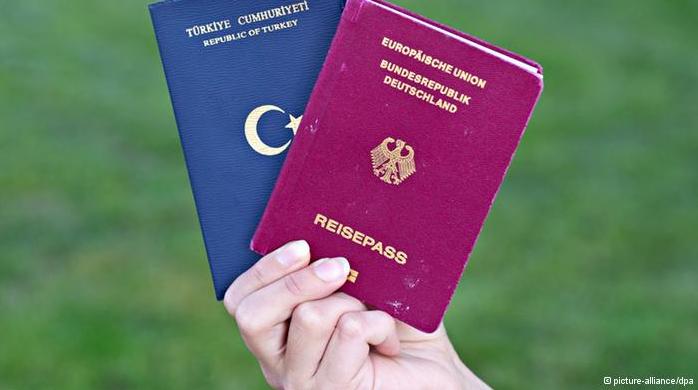Europe Dual citizenship in Germany
德国 双重国籍在德国
Jus sanguinis revisited
血统主义死灰复燃?
How not to treat people with more than one passport
怎样不来对待拥有多重国籍的人
Backing Turkey and Germany together
期望土耳其能与德国“联姻”
The case of a woman from Hanau, in Hesse, shows why Kenan Kolat, leader of Germany’s Turks, calls the German citizenship law “absurdity cubed.” Born in Germany to Turkish parents, she was a dual citizen. According to the law, she had to relinquish one passport between her 18th and 23rd birthday. She chose to forgo the Turkish one. But the Turkish bureaucracy was slow, her birthday came—and her German citizenship went instead.
一位来自哈瑙的女士在海赛的亲身经历,向我们解释了德国土耳其社区组织的领袖Kenan Kolat认为德国《国籍法》“荒谬至极”的原因。作为出生在德国的土耳其人,她具有双重国籍。但依据国籍法规定,她必须在18岁到23岁期间选择放弃一个国籍。德国国籍是她最终的选择,但是由于土耳其相关机构办事缓慢,直到她生日那天,她的德国国籍也没有生效。

International law has never fully embraced multiple citizenship. Many countries frown on it, though others take a more relaxed attitude. Germany, however, manages to make it especially complicated for citizens of foreign origin. Its traditional approach goes back to a law passed before the first world war. Based on jus sanguinis (“right of blood”), it gave citizenship to anybody of German descent, but not to foreigners born in Germany, as countries such as America and France that practise jus soli (“right of soil”) do. Then, in 1999, a centre-left government added the two notions together. This would have let a woman born in Germany to Turkish parents be simultaneously German and Turkish. But that law coincided with a regional election in Hesse, where the centre-right Christian Democratic Union (CDU) seized on the issue to mobilise its conservative base in opposition. The CDU won the state and took control of the upper house, where it blocked the new law.
国际法从来没有真正包容过多重国籍。尽管有一些国家允许自己国家的人拥有多重国籍,但还是有很多国家不承认多重国籍。而德国对外籍人申请申请加入德国国籍的条件十分严苛,最传统的办法还要追溯到一战前通过的法条。依据 jus sanguinis(“血统主义),拥有德国国籍公民的后代自动拥有德国国籍,但是出生在德国的外籍子女并不能获得德国国籍。而像美国、法国等国家则实行 jus soli (“出生地主义”)。随后,1999年,德国左翼党将这两种方法都采纳了进来。这样,出生在德国的土耳其后裔就能同时获得德国和土耳其国籍。但是这新法条的颁布正好与在海赛举行的地区大选的时间不谋而合。在海赛,右派保守党基民党(CDU)抓住了这个问题不放,利用其来动员保守方反对法条的通过。最终CDU赢得了大选,控制了高层,并且封锁了新法条的颁布。
A compromise was reached in 2000. Children born in Germany to foreign parents after 1990 can get two passports but have to choose one citizenship before they are 23. This year, the first cohort of such children, about 3,300, reach that age. From 2018 the number will reach 40,000 a year or more. There are about half a million such cases all told, more than two-thirds of them of Turkish descent.
然而,在2000年,德国《国籍法》却做出了让步。在1990年之后出生在德国的外籍子女能够获得双重国籍,但是必须在他们23岁之前做出选择哪个国籍的决定。这一年,符合年龄标准的第一批试点孩子大约有3300人。预计到2018年,人数会增加到每年40000人甚至更多。已经知晓的大约有50万这样的案例,其中超过三分之二的人是土耳其后裔。
Yet not all young dual citizens must choose. A child born to a German parent in America, say, retains both passports for life. So does a child born to a Greek or Spanish parent in Germany, because dual citizenship is allowed for members of the European Union and Switzerland. This seems unfair to the Turks. This week Recep Tayyip Erdogan, the Turkish prime minister, said as much to Angela Merkel, Germany’s chancellor, during her visit to Turkey. (Mrs Merkel also explained that, though happy for Turkey’s EU accession talks to continue, she retained her “scepticism” about its ever becoming a member.)
而今,不是所有拥有双重国籍的年轻人都必须做出选择国籍的抉择。据一位出生在美国的德国小孩所称,他可以终生保留双重国籍。出生在德国的希腊或西班牙小孩同样也能获得这样的待遇,因为双重国籍已经被允许发放给欧盟成员国以及瑞士的公民。这样似乎对土耳其人并不公平。本周,在德国总理Angela Merkel访土期间,土耳其总理Recep Tayyip Erdogan传递了上述意图。(默克尔女士也表示,虽然很高兴看到土耳其加入欧盟谈判得以继续进行,但是她对土耳其加入欧盟仍保持“怀疑”态度。)
Besides being unjust and creating two classes of citizens, the law is a nightmare to administer, says Ulrich Kober at Bertelsmann Stiftung, a think-tank. Because countries like Iran do not let citizens renounce their citizenship and others make it costly or difficult, German law in theory grants exceptions. But the rules are not clear, reckons Kay Hailbronner, a lawyer. To make the decisions even more arbitrary, the 16 German states process the paperwork, and each uses different forms.
新法条的颁布不仅仅是一种不公平的表现形式,并且在市民中划分出了2种阶级,而且还是管理者的噩梦,Bertelsmann Stiftung的一位智囊团成员 Ulrich Kober这样说道。由于像伊朗这样的国家不允许其居民放弃伊朗国籍,而其他人要想取消伊朗国籍也是件困难的事且费用昂贵,所以德国国籍法按理应该允许例外情况,但事实上,法条中规定地十分模糊,Kay Hailbronner律师这样认为。德国的16个州甚至独立处理法条的相关文件,并且各自使用不同形式的文件,结果决策变得更加随意。
What better way to irritate those citizens whom Germany’s politicians say they want to integrate? Mr Kober thinks Germany should simply allow dual citizenship. So do the centre-left parties hoping to replace Mrs Merkel’s government in September’s election, as well as the CDU’s coalition partner, the Free Democratic Party. It may yet happen.
如德国的政治家所言,有什么更好的办法能够安抚那些想要融入德国的居民呢?Kober先生认为德国要做的不过是简简单单地允许双重国籍。就像希望能在9月份的大选中击败默克尔政府、基督教民主联盟和自由民主党的左党一样。它总有一天会实现的。翻译:朱大素













